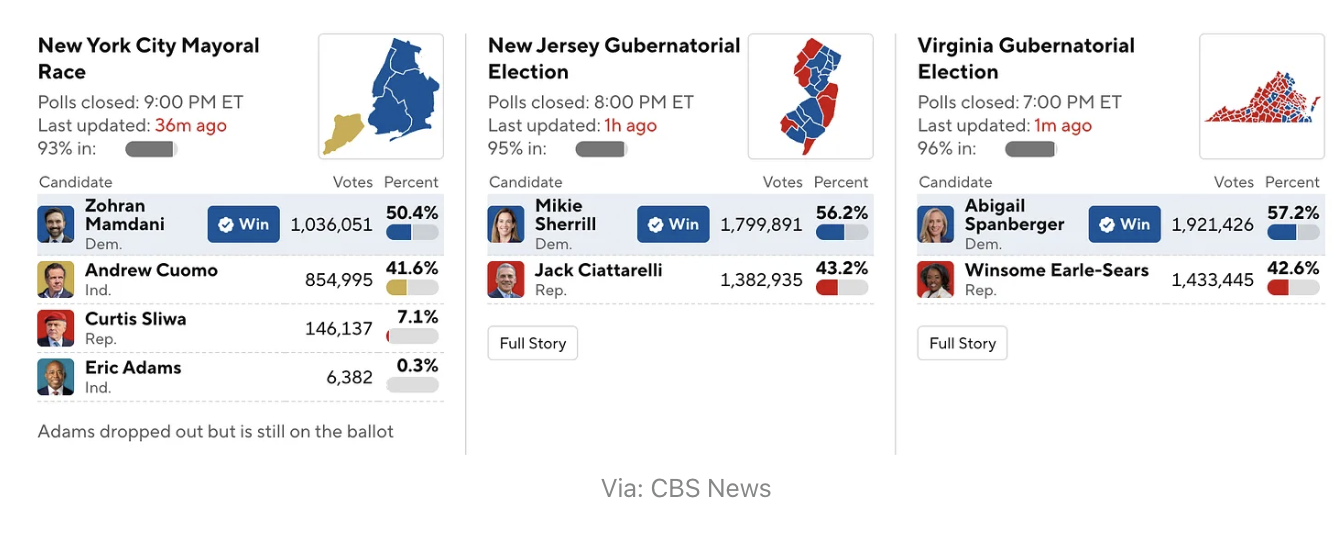Trump Blames Longest Government Shutdown For Democratic Election Sweep
Plus: Tariffs Appear In Trouble After Supreme Court Conservatives Skeptical Of Legality
Good evening,
Researchers say there’s a way to feel happier at work, and maybe even score a raise— Have some morning sex before you get to the office. Seriously.
A little extra morning activity before the workday started enhanced overall employee productivity, job satisfaction, and is even credited with helping workers get pay raises, a new study from Zip Health, an online pharmacy, finds.
By the numbers: Researchers found that full-time workers having AM sex had the highest levels of productivity (71%), with higher rates of task completion (70%), focus (58%), motivation (57%), and job satisfaction (54%). Over half also said they received a raise in the past year.
Who’s getting it on in the morning? Researchers surveyed 1,000 U.S. workers. Baby boomers and Gen Xers are having the most morning sex (20%), followed by millennials in their 30s and early 40s (17%) and Gen Z (16%), according to the study.
The Mo You Know!
🚨 ONE IMPORTANT THING
Dems Sweep Election Night Races: What Does It Mean?
Democrats cleaned house Tuesday, winning governorships in Virginia and New Jersey, key statewide races in Pennsylvania and Georgia, and a major redistricting victory in California that could shape control of Congress next year.
But the night’s most dramatic result was in New York City, where Zohran Mamdani made history.
WHAT IT MEANS FOR NYC
The 34-year-old Democratic Socialist was elected mayor of New York City with more than 50% of roughly 2 million votes, defeating former Gov. Andrew Cuomo, who ran as an independent, and Republican Curtis Sliwa. Mamdani was polling at just 1% in February before winning the summer’s Democratic primary, building his campaign around tackling the city’s affordability crisis.
His message: “The working people of New York have been told by the wealthy and the well-connected that power does not belong in their hands,” he said from Brooklyn Tuesday night. “The future is in our hands.”
The exit polls: New Yorkers who voted for Mamdani tended to be younger, college-educated, middle-income, new to the city, and concerned about the cost of housing in the areas where they live. He energized tens of thousands of young volunteers and first-time voters. A majority of voters said his plans were unrealistic, but about 1 in 6 voters who said that still voted for him, NBC exit polling found.
What went wrong for Cuomo? The former NY governor told Mo News back in July that he “did not appeal to [voters] directly enough” during the primary and that he would fix that for the general election. It didn’t appear he changed much for take 2.
Cuomo just didn’t get voters excited and carried a lot of baggage due to, among other things, sexual harassment allegations against him and questions around his policies around COVID. Slightly more of his voters said their vote was actually against his opponents rather than for him.
What’s next? The question now is whether Mamdani governs the city with pragmatic moderation or embraces the extreme left wing of his party. During the campaign, he promised to freeze rents, create city-run grocery stores, and expand free childcare.
Mamdani said he will pay for that by raising income taxes on city residents who make more than $1 million a year. To do that, he’ll need support from moderate New York Gov. Kathy Hochul (D) — and she’s already rejected the idea (even though she endorsed him).
THE TRUMP FACTOR: Looming over the upcoming Mamdani administration is President Trump. He has called Mamdani “my little communist” and threatened to cut billions in federal funding to the city if Mamdani won.
It doesn’t look like this conflict is going anywhere. During his victory speech last night, Mamdani spoke directly to Trump, saying, “To get to any of us, you will have to get through all of us.”
Will the Democratic Socialist wave spread? Polling shows that 1 in 4 New Yorkers now consider themselves Democratic Socialists — something Mamdani underscored in his victory speech, quoting Eugene Debs, a socialist leader from the late 1800s/early 1900s who ran for president five times and inspired future left-wing movements.
👀 FIRST NEW YORK, THEN THE COUNTRY? Not necessarily. In New Jersey and Virginia, the vibe was different.
Moderate Democrats Abigail Spanberger and Mikie Sherrill won their respective gubernatorial races in Virginia and New Jersey. They both served in the U.S. House, and ran on platforms focused on economic growth/affordability.
“Virginia chose pragmatism over partisanship. We chose our Commonwealth over chaos,” Spanberger said. “You all chose leadership that will focus relentlessly on what matters most, lowering costs, keeping our communities safe and strengthening our economy for every Virginian.”
“We’re not going to give in to our darker impulses here in New Jersey,” Sherrill said after her win. “We know that this nation has not ever been, nor will it ever be ruled by kings” — poking at the anti-Trump “No Kings” rallies.
GOP RESPONSE: President Trump met with Republicans on Wednesday, and blamed the election losses in part on the government shutdown. He called on Senate Republicans to end the shutdown— now in its 36th day and the longest in U.S. history— by ending the filibuster or other measures. He said, “If you read the pollsters, the shutdown was a big factor — negative for the Republicans.”
Republican leaders have resisted the idea. The filibuster is a 60-vote threshold for major legislation to pass in the Senate, as opposed to a straight majority vote. Republicans warn that getting rid of the filibuster could backfire when Democrats regain power.
REDISTRICTING: California voters overwhelmingly approved Proposition 50, a measure allowing the legislature to draw new congressional maps expected to add up to five Democratic U.S. House seats ahead of the midterms.
🚨 ANOTHER IMPORTANT THING
Do Tariffs = Taxes? Supreme Court Appears Skeptical Of White House Argument
The Supreme Court heard arguments over a key piece of President Trump’s economic policy on Wednesday— his sweeping tariff agenda.
Notably, some members of the Supreme Court’s conservative majority — including Chief Justice John Roberts and Justice Neil Gorsuch — signaled skepticism over President Trump’s use of a 1977 emergency law to impose sweeping tariffs on goods from more than 100 countries. They suggested the move may violate the Constitution and Congress’s exclusive power to tax.
How we got here: Trump’s sweeping tariffs average nearly 18%, up from 2.4% before his return to the White House, according to economists at Yale’s Budget Lab.
Lower courts have already ruled that Trump lacked the authority under the 1977 International Emergency Economic Powers Act, a law intended for national security crises, to impose “reciprocal” tariffs after businesses affected by the tariffs and 12 states, most of them Democratic-led, brought the lawsuit. The Trump administration appealed that decision to the high court.
The case could prove pivotal to the Trump administration’s trade and economic agenda. Trump posted Tuesday night that the case was “literally, LIFE OR DEATH for our country.”
“The vehicle is the imposition of taxes on Americans, and that has always been a core power of Congress,” Roberts said.
WHAT’S AT PLAY
The Supreme Court is now weighing whether the president overstepped Congress’s constitutional authority to regulate foreign commerce.
Solicitor General John Sauer argued on behalf of the White House that the tariffs were meant to influence or restrict foreign trade, not raise revenue. He argued the president has the authority to do so during national emergencies.
Liberal Justice Sonia Sotomayor countered, “You say tariffs are not taxes, but that’s exactly what they are.”
Justice Gorsuch also pressed Sauer on whether Congress had effectively “handed off” too much power to the executive branch under the administration’s argument.
“Congress, as a practical matter, can’t get this power back once it’s handed it over,” Gorsuch said. “The president’s a one-way ratchet toward the gradual but continual accretion of power in the executive branch and away from the people’s elected representatives.”
Sauer disagreed, saying that Congress could terminate emergencies.
If upheld, the tariffs could generate $3 trillion over the next decade, but much of it ultimately paid by U.S. businesses and consumers through higher prices.
The legal principals at play: The “intelligible principle test” and Major Questions Doctrine, came up during arguments.
The Intelligible Principle Standard is a legal standard used to determine if Congress has unconstitutionally delegated its legislative power to the executive branch, violating the separation of powers.
The Major Questions Doctrine requires executive branch actions of vast economic and political significance to be clearly authorized by Congress. It was one of the legal principles used to strike down Biden administration priorities like broad student loan forgiveness.
⏳ THE SPEED READ
🚨NATION
At least 12 dead in UPS plane crash and explosion at Kentucky airport (WLKY)
Shutdown stalemate drags on as impasse becomes longest in US history (CNN)
California Republicans sue over new U.S. House map approved by voters (SPECTRUM NEWS)
Trump administration ending Temporary Protected Status for South Sudanese nationals (CBS)
🌎 AROUND THE WORLD
Louvre video security password was ‘louvre,’ report reveals (MASHABLE)
Prince William criticizes Amazon deforestation crime in Brazil visit (BBC)
Mexico President Claudia Sheinbaum groped by man in street, says she’s pressing charges (NBC)
Japan deploys the military to counter a surge in bear attacks (AP)
Typhoon Kalmaegi kills at least 85 in the Philippines, heads toward Vietnam (REUTERS)
📱BUSINESS, SCIENCE & TECH
McDonald’s sales rise, but CEO expects low-income diners to spend less into next year (CNBC)
Starbucks unionized workers say they’ll strike on Nov. 13 if coffee giant doesn’t finalize contract (CBS)
American Airlines announces cuts to management at its Texas headquarters (AP)
Google adds Gemini chatbot to Maps (AXIOS)
🎬 SPORTS & ENTERTAINMENT
ICYMI FROM THE 📲
Via Creative Commons
In case you missed it… Actress Jennifer Lawrence says that she and Emma Stone are producing a Miss Piggy movie. She made the announcement during an episode of Bowen Yang and Matt Rogers’s “Las Culturistas” podcast, which aired on Wednesday.
The film is in early development at Disney, which owns the rights to the Muppets. Cole Escola, the Tony Award-winning performer who wrote the Broadway comedy ‘Oh Mary,’ will be writing the script.
Miss Piggy, a puppet known for her prima-donna personality, was developed by Frank Oz and Bonnie Erickson in the 1970s. There has been a Kermit the Frog movie, but Miss Piggy has never starred in her own feature film. 🎥🐽








